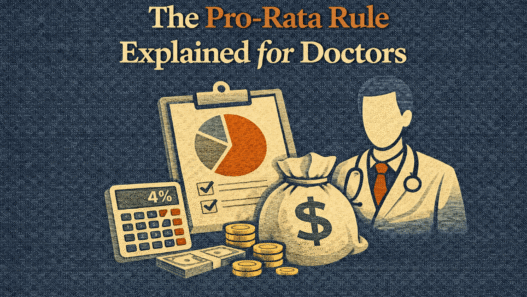When you build a house, you never entertain the thought of skipping the fire alarms or skimping on the wiring. You make sure the foundation is strong, the exits are clear, and the whole place is up to code. Because if something goes wrong, you don't want everything to go up in smoke.
That's exactly how asset protection works.
Doctors are well-known for being among America's most highly compensated professionals, but they're also uniquely exposed to a boatload of legal and financial threats.
And while a successful medical career can lead to a million-dollar net worth by midlife, many docs start out in the red. What with six-figure student loan debt, and the modest earnings during the grueling years of residency.
Unfortunately, just when they start to dig themselves out, they're hit with a new wave of risk in the form of lawsuits, practice debt, contract disputes, and predatory creditors. By the time they reach age 55, over half of the physician population can expect to be a millionaire.
That kind of growth attracts attention, and not always the good kind.
In fact, over 80% of high-net-worth ($5 million+) individuals believe their wealth makes them a target for litigation. Are you one of them? Even if your assets don't add up to millions, you've worked hard for them, nonetheless. They deserve your protection and concern.
So, how do doctors protect what they built with their blood, sweat, and tears? Let's talk about it.
Malpractice Insurance: A Good Start
When we hear “asset protection,” malpractice insurance is the first thing that comes to mind, and rightly so. According to the American Medical Association (AMA), around one-third of doctors have faced a medical liability claim in their careers.
There are also those who've had to contend with being sued multiple times. The AMA further notes that it's not really a question of if a physician will be sued, but when. The longer doctors stay in practice, the more likely they are to face a liability claim.
That's why a good malpractice policy goes without saying.
Doctors need to ensure that their policy includes sufficient coverage limits so that a big claim doesn't bleed into their personal assets. It should come along with strong legal defense benefits and a consent-to-settle clause, which lets you decide whether to settle a case, not just your insurer.
Some policies are better than others, especially when it comes to customer service and proactive risk management. Being able to call your insurer and talk through a tricky situation before it blows up is an underrated perk I didn't know I needed.
Unfortunately, malpractice insurance isn't bulletproof. And it won't help you in non-clinical battles like a contract gone wrong with a business partner, or a personal creditor trying to claw at your home or retirement account.
Lawsuits After FIRE
Doctors chasing FIRE tend to focus on three things, namely savings rate, investing strategy, and, of course, tax efficiency. But without a legal shield around that portfolio, they've missed the fourth (and perhaps the most fragile) leg of the FIRE stool: asset protection.
All it takes is one misstep, one judgment to derail decades of careful planning. You don't have to lose the lawsuit to lose your wealth. Even defending yourself long enough will take you there eventually.
The problem isn't that you'll get sued — that sort of comes with the territory. The real problem is that if you do, you won't get a warning. And by the time you see it coming, it's often too late to act.
Tools That Work for Doctors
When it comes to protecting your assets, not every strategy is worth your time or trust. But some tools have stood the test of lawsuits, audits, and aggressive creditors.
When set up right and used proactively, these are the legal and financial instruments doctors can actually rely on.
Titling and State Exemptions
Sometimes the simplest tools are the most powerful.
Titling your home as Tenancy by Entirety (TBE) can shield it from individual creditors. If you're married and live in a state that recognizes TBE. Simply put, titling means whose name is legally on a property.
When you title your home as TBE, it means you and your spouse own the property together as one legal unit. In states that allow TBE, this setup can stop creditors from going after the home if only one of you has debts, because neither of you owns the home alone.
But not all states offer this protection. Click here to find out if your state is one of the 25 that do.
State-specific exemptions matter too. In Florida and Texas, for example, the homestead exemption protects your primary residence outright. Check out which other states have this exemption here.
Federally speaking, 401(k)s are protected under the Employee Retirement Income Security Act (ERISA), but IRAs and Roth IRAs depend on your state as well. Some states protect them fully, while others do so barely at all. And inherited IRAs? Those often go unprotected.
Your protection starts with knowing how much of it your zip code affords you.
Trusts
Trusts are often misunderstood. They're not just for the ultra-rich or people trying to hide their money. A trust is a legal structure that separates your personal assets from your identity, meaning that if someone sues you personally, they can't touch what's inside the trust.
But not all trusts are created equal. In the U.S., asset protection trusts are only fully effective in certain states, and even then, they're vulnerable to legal challenges.
Domestic Asset Protection Trusts (DAPTs) are legal in 17 states and can be a fortress around your wealth if created before you face a legal threat.
These trusts allow you to benefit from the assets you place inside (like income and distributions) while legally preventing creditors from accessing them. They're powerful but complicated as well. And if your state doesn't allow them, you may need to jump through additional hoops to establish one in a DAPT-friendly jurisdiction.
High-risk professionals like doctors often turn to Offshore Asset Protection Trusts (OAPTs). When you place assets in a FAPT that operates in jurisdictions like the Cook Islands or Nevis (among others), you create a legal and geographic barrier that most creditors simply can't afford to penetrate.
And for those wondering, yes, OAPTs are legal and ethical. Only thing is, you may have to disclose your OAPT to the federal government.
Then we have irrevocable trusts for spouses and kids. While less flexible than DAPTs, irrevocable trusts can shift assets out of your name entirely. Done right (and early), they can protect wealth from future legal claims while still serving your loved ones.
Limited Liability Companies (LLCs)
If you hold a rental property or have 1099 income streams like consulting or moonlighting, etc., owning them in a well-structured LLC is critical. It keeps liabilities from crossing into your personal finances.
But remember, sloppy management like commingling personal and business funds is enough ammunition for any litigator to pierce that corporate veil and have a free-for-all.
Family Limited Partnerships (FLPs)
For doctors with generational wealth goals, FLPs can provide both tax advantages and creditor protection. They allow discounted gifting of assets to family while restricting access to the partnership's value from outside threats. This option is certainly not for the faint of heart, but can be incredibly effective with thorough research and good counsel.
Alternative Dispute Resolution (ADR)
Nobody wants to air out dirty laundry in court. Alternative dispute resolution, which includes mediation and arbitration, can offer physicians a faster, cheaper, and more private route to settle legal disputes.
If structured right, ADR can keep disputes with staff, contractors, or partners out of court. It can protect your reputation and reduce legal fees dramatically. Employment contracts should include ADR clauses, as should any of your agreements with business partners.
Think of it like a prenup, protecting you from potential professional disagreements if things ever go south.
Common Mistakes That Leave Doctors Exposed
Too many physicians think writing a premium check to their insurer is the be-all, end-all of asset protection. But here are some factors that actually sink doctors in court:
- Relying solely on malpractice insurance.
- Starting asset protection after a claim is filed.
- Using revocable trusts for protection (sorry to say, but they don't shield anything).
- Holding real estate personally.
- And finally, mixing protected and unprotected assets in one account.
The law sees through last-minute damage control. Asset protection must be clean, legal, and proactive. Otherwise, it's just a waste of your time and money.
The Game Plan
Building a robust asset protection plan doesn't require you to become a legal expert, but it does need your effort and careful consideration.
Start by doing an asset inventory. List every asset you own, be it real estate, brokerage accounts, business income, or retirement accounts. All of it. Then determine what's at risk under your state's laws.
Hiring a specialist attorney is a must for those who're serious about asset protection. You need someone who understands both asset protection and the medical-legal landscape. It's also important to update your asset protection policies as life moves on. Did you change specialties, move states, or add another business? These changes affect how ironclad your protection is.
Physicians in high-risk specialties should plan even earlier. Malpractice risk isn't evenly distributed.
AMA data shows that roughly 62% of OB-GYNs and 59.3% of general surgeons have faced a lawsuit at some point in their careers, while only 7% of allergists/immunologists and 8% of hematologists/oncologists have been sued, putting them among the specialties with the lowest risk.
But even low-risk doesn't mean no risk. One lawsuit is all it takes to upend your finances, and that's a place none of us ever wants to be in.
Frequently Asked Questions
Can I lose my house in a malpractice suit?
Yes. Unless your state has a strong homestead exemption or your home is protected by TBE or a trust.
Are IRAs and 401(k)s protected?
401(k)s are protected under federal law. IRAs vary by state. Inherited IRAs often aren't protected at all.
What trust is best for me?
In most cases, a DAPT (if legal in your state) offers the best mix of access and protection. But irrevocable family trusts also deserve your attention.
Does an LLC protect everything?
Only if it's done right. Do not give personal guarantees. Do not mix funds. And build a real business structure, because having the paperwork all sorted alone will leave you vulnerable to the vultures.
When should I start?
Now. Once a lawsuit is filed or even threatened, most asset moves can be seen as fraudulent transfers.



















